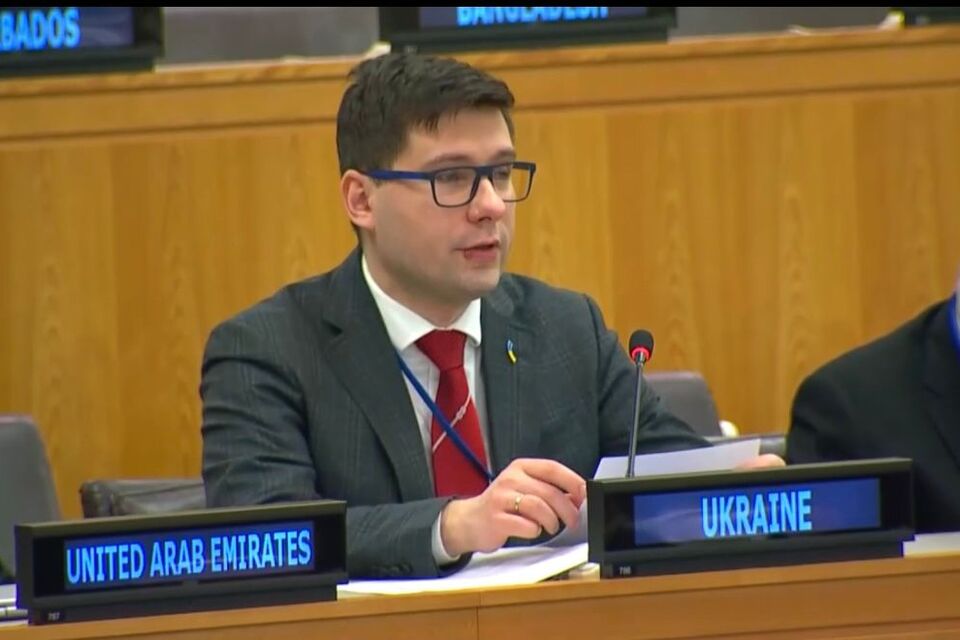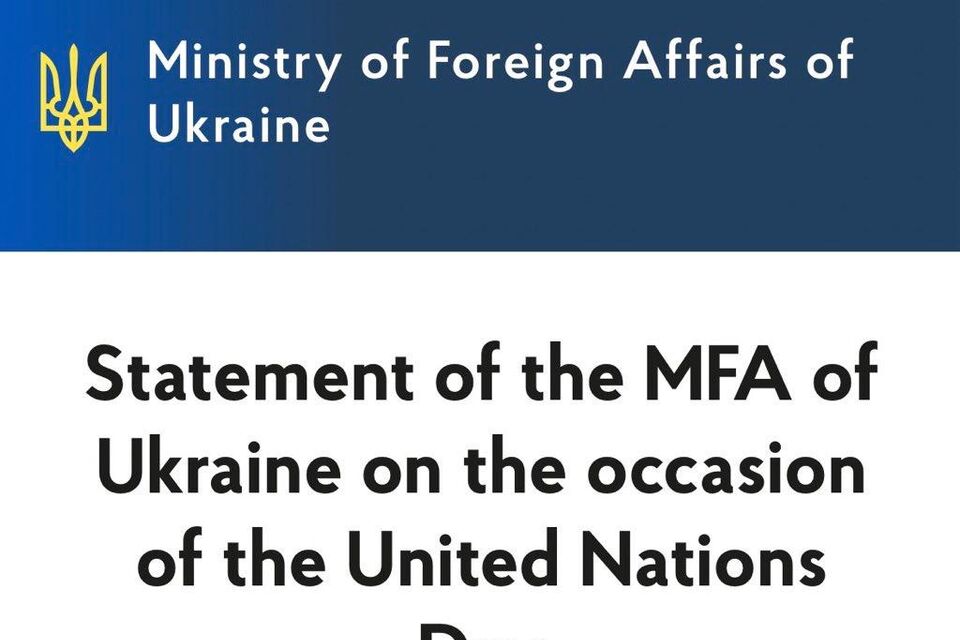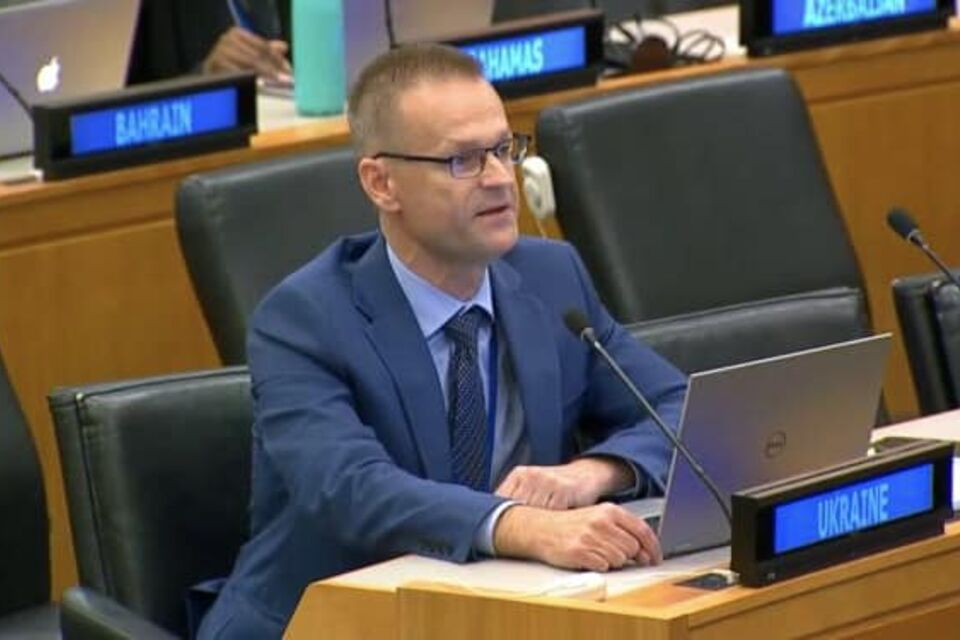Joint statement of Ukraine, Georgia and the Republic of Moldova at the Special Committee on the Charter of the United Nations and on the Strengthening of the Role of the Organization

Mr. Chair,
I have the honor of speaking on behalf of Georgia, the Republic of Moldova, and my own country, Ukraine.
Let me start by expressing our gratitude to the Secretariat for the preparation of the meetings of the current session of the Special Committee on the Charter and join other delegations in congratulating you and other members of the Bureau on your election.
The Charter of the United Nations is the main international treaty with a universal character, codifying the basic tenets of international relations in its variety, from the sovereign equality of states to the prohibition of the use of force in any manner inconsistent with the purposes of the United Nations, with the core aim to save succeeding generations from the scourge of war by guaranteeing international peace and security. In this regard, all states are obliged under Article 2 of the Charter “to settle their international disputes by peaceful means in such a manner that international peace and security, and justice, are not endangered” and “to refrain in their international relations from the threat or use of force against the territorial integrity or political independence of any state, or in any other manner inconsistent with the purposes of the United Nations”.
In achieving these aims, the UN Charter offers a large variety of means to peacefully settle international disputes, including through regional arrangements and agencies, as stated in article 52 that “nothing in the Charter precludes the existence of regional arrangements or agencies for dealing with such matters relating to the maintenance of international peace and security as are appropriate for regional action, provided that such arrangements or agencies and their activities are consistent with the purposes and principles of the United Nations”. Furthermore, the 1994 “Declaration on the enhancement of cooperation between the United Nations and regional arrangements or agencies in the maintenance of international peace and security”, adopted by resolution 49/57 of the General Assembly, recognize that regional arrangements or agencies can play an important role in preventive diplomacy and in enhancing regional and international
cooperation and emphasize further that the efforts made by regional arrangements or agencies, in their respective fields of competence, in cooperation with the United Nations can usefully complement the work of the Organization in the maintenance of international peace and security.
The Republic of Moldova, Georgia, and Ukraine respect the assumed obligations in good faith, both at regional and global level, attach great importance to all peaceful means of dispute settlement under Article 33 of the UN Charter as members of various regional organizations which demonstrated commitment to the principles of the UN Charter, as well a constructive cooperation with United Nations.
Mr. Chair,
Our region is facing multiple provocations and uncertain times, especially since the large-scale
aggression of the Russian Federation against Ukraine.
Since February 2014, when Russia tried to commit a brutal land grab of the Autonomous
Republic of Crimea and the city of Sevastopol, Ukraine adherently referred to instruments of
international law seeking to protect its rights and legitimate interests in accordance with the
norms of international law.
Eight years later, it not only didn’t stop the aggression but also launched its unprovoked,
unjustified, and brutal full-scale invasion of Ukraine. Since then, Russian forces continue to
destroy Ukrainian cities and villages, kill thousands of innocent people, including women and
children, as well as consolidate terror practices in the temporarily occupied areas. This clear act
of aggression violates the purposes and principles of the UN Charter and has an adverse impact
across the globe.
In this regard, we recall GA Eleventh Emergency Special Session resolutions, adopted during past
12 months which explicitly demonstrated overwhelming support and unity of sovereignty,
territorial integrity and political independence of Ukraine by the UN Member States.
Today Ukraine continues to exercise its inevitable right to self-defense in accordance with Article
51 of the UN Charter to repel Russia’s aggression aiming to ensure a comprehensive, just, and
lasting peace, as well as to uphold the principles of the UN Charter.
In this context, I would like to draw your attention that the General Assembly at the 11th
Emergency Special Session on 23 February 2023 is due to consider the draft resolution entitled
“UN Charter principles underlying a comprehensive, just and lasting peace in Ukraine”.
|
The aforementioned resolution will contribute to our joint efforts to bring the war to an end as |
|
well as to protect the fundamental principles of international law and the UN Charter. It also |
|
urges countries to work together in addressing the global impact of the war, including on food |
|
security, energy, finance, environment, and nuclear security and safety, as well as emphasizes |
the need to ensure accountability for the most serious crimes under international law committed
on the territory of Ukraine.
Mr. Chair,
It is worth mentioning that what we see in Ukraine today is a continuation of the same pattern of the aggressive policy started in Georgia in the early 1990s which continued with the full-scale military aggression against Georgia in 2008 and attempts to forcibly change the borders of a sovereign state in Europe and subsequent occupation of Georgian regions of Abkhazia and Tskhinvali region/South Ossetia.
Against this background, Russia continues to exercise effective control over 20% of Georgia’s territory and its illegal military presence in Georgia’s occupied regions, in parallel Russia intensifies annexation process of both regions, enhances installation of barbed wire fences and other artificial barriers along the occupation line, as well as continues illegal detentions and kidnappings of Georgian citizens, closure of the occupation line and restriction of freedom of movement that creates dire security, humanitarian and human rights situation on the ground.
In this light, our firm stance, and decisive joint efforts of international community, first and foremost of the UN, are essential to ensure that Russia ceases its destructive actions against Georgia and the wider region and implements its international obligations envisaged by the UN Charter as well as EU-mediated 12 August 2008 Ceasefire Agreement.
Nevertheless, Georgia has been adhering to the policy of peaceful resolution of Russia-Georgia conflict based on two main pillars – de-occupation of the Georgian regions on the one hand, and reconciliation and confidence building between the communities divided by the occupation lines, on the other, underpinned by respect of international law and the UN Charter. Furthermore, Georgia is committed to utilize every peaceful means at its disposal as stipulated in the Article 33 of the UN Charter, including, inter alia, engaging in negotiation formats, namely the Geneva International Discussions (GID) and Incident Prevention and Response Mechanisms (IPRMs) under the GID.
At the same time resorting to judicial remedies is another peaceful conflict resolution instrument used by Georgia. In this context, I wish to recall the judgment of the European Court of Human Rights of 21 January 2021. In Its landmark ruling the ECHR has confirmed Russia’s occupation and effective control over Abkhazia and Tskhinvali regions as well as Russia’s responsibility for the mass violations of human rights on the ground and for deprivation of right of IDPs and refugees to return to their homes. Moreover, the conclusion of the investigation phase in the Situation in Georgia by International Criminal Court in 2022 that confirmed the responsibility of the Russian Federation for war crimes and crimes against humanity committed against ethnic Georgians during Russia’s military aggression in 2008 and issuing arrest warrants should be emphasized.
Mr. Chair,
Negotiations, as key means of settling states disputes, have been continuously used by the Republic of Moldova since 1993. For 30 years, the Republic of Moldova has been requesting for a complete and unconditional withdrawal of Russian military troops stationing on its territory, in violation of its constitutional neutrality and in the absence of the host country consent. And our position remains unchanged. The illegal presence of the Russian military troops in the Transnistrian region poses a security and environmental threat to the country and to the region as a whole.
In this regard, we recall the relevant UNGA resolutions on cooperation between the United Nations and the Organization for Security and Cooperation in Europe, particularly resolutions 54/117 of l5 December 1999, 55/179 of l9 December 2000, 56/216 of December 2001 and 57/298 of 20 December 2002 – are eloquent examples of how cooperation between regional organizations and the UN aims at the peaceful settling of disputes, as well as the UNGA resolution 72/282 of June 2018, and emphasize the commitments undertaken by the Russian Federation at the Organization for Security and Cooperation in Europe Summit held in Istanbul in 1999 on the withdrawal of its military forces and armaments from the territory of the Republic of Moldova.
In conclusion Mr. Chair,
The United Nations solid actions and decisions to respond to the threat of international peace and security is as vital as ever to avoid further deterioration of the security environment both on a regional and international level, as well as for the people of Ukraine, Georgia and the Republic of Moldova, who continue to face the threat and suffer from the use of force against their sovereignty, territorial integrity, and political independence. International community holds a collective responsibility to act when violations of international law are being committed.
Ukraine, Georgia, and Republic of Moldova welcome cooperation between the UN and other regional agencies and arrangements aimed at contributing to the peaceful world and strongly believe that respect of the UN Charter, univocal and nonselective, by all UN member states, is a prerequisite of international peace and security.
I thank you!



